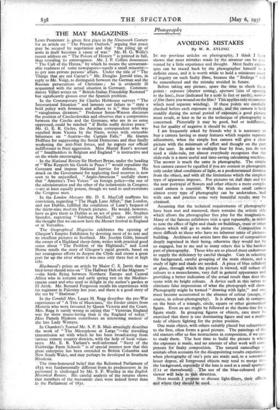THE MAY MAGAZINES' -
Loan PONSONBY is given first place in the Nineteenth Century for an article on "The Present Outlook," arguing that peace play be secured by negotiation and that "the piling up of arms in itself becomes a cause of war." Mr. H. G. Wells's recent address on "The Poison of History" is-printed in full, thus revealing its extravagance. Mr. J. P. Collins denounces "The Cult of the Hyena," by which he means the unwarrant- able readiness of some newspapers—surely a small minority=. to pry into private persons' affairs. Under the title of "The Things that are not Caesar's" Mr. Douglas Jerrold tries, in reply to Mr. Voigt, to distinguish between the German and the Russian persecutions of Christians ; he is evidently ill acquainted with the actual situation in Germany. Commen- datore Villari writes on "British-Italian Friendship Restored" bin significantly glosses over the Spanish problem.
In the Contemporary Sir Charles Hobhouse surveys "The International Situation" and laments our failure to "state a bold policy with firmness and adhere to it," thus terrifying "vainglorious dictators." Professor Seton-Watson discusses the position of Czechoslovakia and observes that a compromise between the Czechs and the Germans,- who are in no sense oppressed, could be reached "if Berlin really desires peace." Mr. G. E. R. Gedye, the -Austrian correspondent who Was expelled from Vienna by the Nazis, writes with excusable bitterness on "Austria—the Curtain Falls." He Waffles Dollfuss for suppressing-the Social Democrats and thus fatally weakening the anti-Nazi forcesI and he regrets our official indifference to Nazi aggression. Miss Muriel Kent's account
" Smallholders in Belgium and England" is instructive and on the whole encouraging.
I In the National Review Sir Herbert Bryan, under the heading of" Who Keepeth his Goods in Peace ? " would repudiate the Covenant and impose National Service for defence. His attack on the Government for neglecting food reserves is now seen to be unjustified. " Anglo-American " usefully shows that "America's Two Voices" on foreign policy—the one of the administration and the other of the isolationists in Congress ..are at least equally potent, though we tend to underestimate the 'Congress men.
In the London Mercury Mr. D. S. MacColl reaffirms his Conviction, regarding The Hugh Lane Affair," that London, and not Dublin, fulfilled the conditions of Lane's bequest of the thirty-nine modem French pictures. He would, however, have us give them to Dublin as an act of grace. Mr. Stephen SPender, regretting "Salzburg Naiified," takes comfort in the thought that we can now have the Mozart festival in England or at Versailles.
The Geographical Magazine celebrates the opening of Glasgow's Empire Exhibition by devoting most of its text and its 'excellent pictures to Scotland. Mr. Jocelyn Gibb, himself the owner of a Highland sheep-farm writes with practical good sense about "The Problem of the Highlands," and Lord Home retells the story of Glasgow's rapid growth, based on her courageous efforts to deepen the Clyde and create a great port far up the river where it was once only three feet at high tide.
Blackwood's prints an article by Major C. S. Jarvis that no bird-lover should miss on" The Halfway Halt of the Migrants" —the birds flying between Northern Europe and Central Africa who in autumn and early spring rest on the Mediter- ranean coast and who used to delight in the author's garden at El Arish. Mr. Bernard Fergusson recalls his experiences with his regiment in Palestine last year, and there is a good story of the sea by "Shalimar."
In the Cornhill Mrs. Laura M. Ragg describes the pre-War experiences of " A Trio of Musicians," the Eissler sisters from Moravia who were favoured by Queen Victoria and the Court. Mrs. Ragg is surely wrong in saying that "Victorian England was far more music-loving than is the England of today." Miss Pamela Hinkson contributes an interesting memoir of the late Lady Wemyss.
In Chcrmbers's Journal Mr. S. P. B. Mais amusingly describes the work of "The Microphone at Large "=-- the travelling transmission set with which he has been broadcasting from various remote country districts, with the help of local _volun- teers. Mr. E. R. Yarham's well-informed "Story of the Fairbridge Farm Schools" is of special interest now that this ireat enterprise has been extended to British Columbia and New South Wales, and may perhaps be developed in Southern Rhodesia.
The time-honoured belief that the Reformed Parliament of 1833 was fundamentally different from its predecessors in its personnel is challenged by Mr. S. F. Woolley in the English Historical Review. His careful analysis of the returns shows that members of the mercantile class were indeed fewer than in the Parliament of 1831. . _


































































 Previous page
Previous page